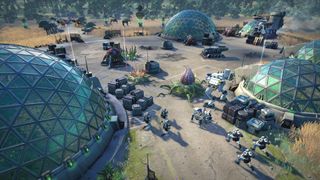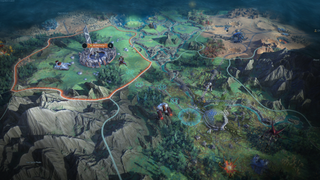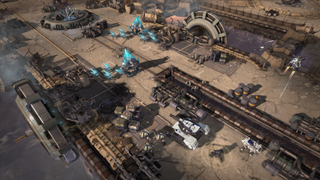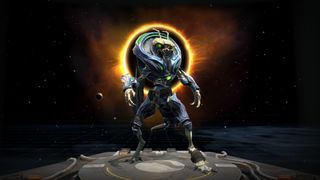Age of Wonders: Planetfall steers the strategy series in an exciting direction
Early impressions of Triumph Studios' upcoming sci-fi 4X.

"Think Fallout, but on a galactic level," says Triumph Studios CEO Lennart Sas during my hands-off demonstration of Age of Wonders: Planetfall. That's an ambitious opener, but I'd argue that 'Age of Wonders in a sci-fi setting' carries similar appeal.
Either way, Planetfall looks lovely. It's a turn-based 4X strategy game that swaps the series' familiar medieval trappings for cyborgs, cryosleep and other futuristic fixtures—and is also Triumph's first outing under Paradox's umbrella. Sas stresses the importance of diplomacy this time round, while continually referencing "casus belli"—an act which justifies war, and a staple feature of Paradox's grand strategy games.
As scavenging droids, bioengineering amazons, or vanguard forces fresh from coldsleep, to name but a few of its factions, Planetfall tasks players with rebuilding the once prosperous galactic empire-spanning Star Union. Ultimately, you seek a new Age of Wonders—civilizations now live in isolation, blaming each other for the current state of the universe—thus campaigns are about resettling procedurally generated worlds. Players are free to craft their own landscapes, however pre-set templates are available too.

Upon landing, Planetfall follows the series' blueprint of growth and expansion. You'll spread yourself across planetary sectors which yield various benefits. Sas explains that geological features such as cities and ruins can improve defence, while other more fertile land can be used to harvest food and resources. Playing to its sci-fi principles, invading hostile robot camps is always a dangerous move—but conquering and repurposing their hardware for future battles is a payoff worth considering.
To this end, the scope for experimentation Planetfall has over its medieval counterparts is intriguing—something which feeds into its customisation options. The bioengineering trait, for example, lets you to spawn hybrid alien-humans; whereas new personal equipment means leaders can start off in armored vehicles.
Planetfall's futuristic facade and turn-based, grid-set combat means comparisons to the likes of XCOM are inevitable, Sas tells me. Abilities such as cover and overwatch, I'd argue, galvanises their likeness. "That's unavoidable," says Sas. "I think what's different with XCOM is that our battles need to be concise, they can't last for one hour. They need to allow for a large variety of [participants] be that critters, monsters, tanks, airstrikes. Once you play, I think you'll notice numerous, quite significant differences between the two. Equally, there's cover, overwatch, destructible terrain too."

I think what's different with XCOM is that our battles need to be concise, they can't last for one hour.
Lennart Sas.
Sas says there's more interaction with said terrain here than in previous Age of Wonders games. Hazards, such as explosive cars, will determine your route through specific battlefields, whereas multi-tiered landscapes can be used in defence and attack. "These choices are a lot more apparent than in older Age of Wonders," adds Sas, "which was basically a flat field with obstacles that mainly impacted movement. There's a lot more going on."
PC Gamer Newsletter
Sign up to get the best content of the week, and great gaming deals, as picked by the editors.
Despite comparisons, Planetfall carries new systems of its own. Staggering, for example, occurs when you hit an opponent hard, shaking them, and causing them to lose one of their action points—represented by three white bars tucked beneath their health bar—while simultaneously offsetting any special attack the enemy may have lined up. It's not always best to focus all your firepower on individual enemies, then, as you might want to spread attacks around to reduce the efficiency of everyone on the field.

To this end, operations provide off-field artillery and satellite strikes. The combat demonstration I'm shown pits Prometheans against a high-level cyborg race. The former specialises in planetary extermination, I'm told, which means calling in pyrex missiles—a gas used by the Promethean's for said extermination—is considered a wise tactic. Upon impact, the battlefield is filled with a choking flammable gas. Anyone stood within this pool has a much lesser chance of landing hits, and if they don't escape the cloud's perimeter by their next turn, they'll explode. And if it wasn't clear before now, Planetfall's sci-fi details should make for some interesting run-ins.
Another notable feature Planetfall holds over its forerunners is grazing, a mechanic introduced following player feedback. Considered a "consolation prize for your bad luck", grazing means that missed shots can sometimes land half damage. Sas says total misses are "fairly rare", and explains that this new addition aims to balance excitement and frustration in the heat of battle.
All of which is exciting. Age of Wonders: Planetfall is at the end of its production phase, and is due at an as yet undetermined date in 2019. Its planetary sci-fi combat, new races and factions—the all-female, High Queen-descended Psionic Unit sounds particularly badass—returning siege battles, and emphasis on procedurally-generated worlds gives us plenty to think about till then. Triumph's brief mention of force field operations, space dwarves and a space-age Las Vegas strip might excite fans of the series further still.
Most Popular

